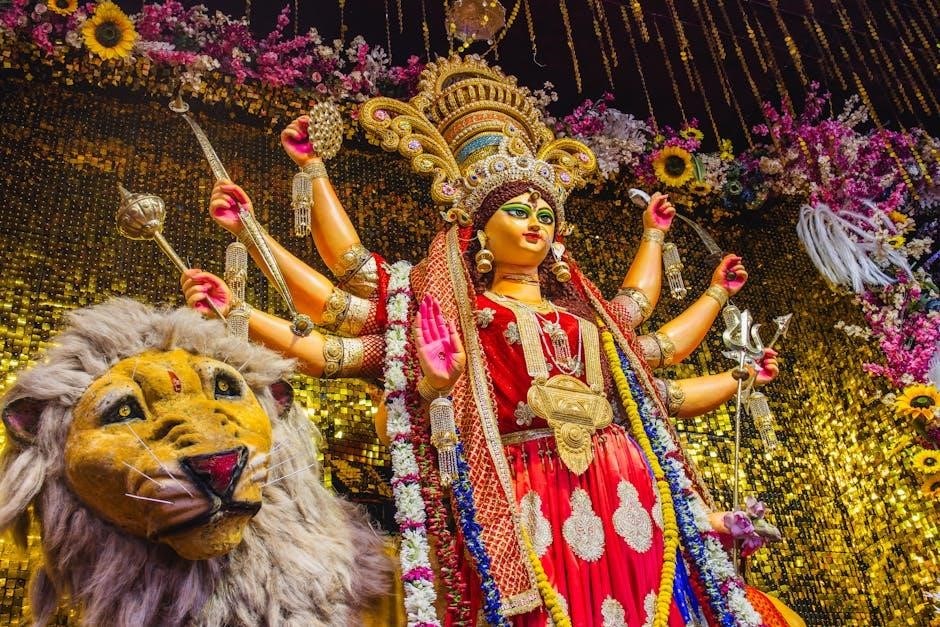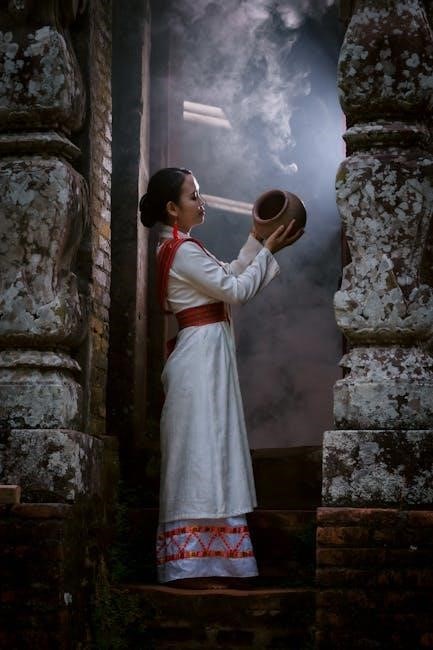Omega Psi Phi Fraternity, Inc., founded on November 17, 1911, at Howard University, is a historically Black Greek Letter Organization dedicated to uplifting communities through service, scholarship, and perseverance. Its rituals and traditions emphasize brotherhood, ethical leadership, and personal growth, shaping members into impactful global citizens.
Overview of the Fraternity’s Founding and Mission
Founded on November 17, 1911, at Howard University, Omega Psi Phi Fraternity, Inc., is the first Black Greek Letter Organization established at a historically Black college. Its mission centers on uplifting communities through service, scholarship, and perseverance. Guided by the cardinal principles of manhood, scholarship, perseverance, and uplift, Omega Psi Phi aims to empower its members and communities, fostering ethical leadership and collective action for societal advancement.
The Significance of Rituals in Fraternity Life
Rituals in Omega Psi Phi fraternity life are vital, grounding the organization’s mission and fostering a deep sense of brotherhood. They initiate members into the fraternity’s values, celebrate milestones, and reinforce the principles of manhood, scholarship, perseverance, and uplift. These sacred practices create a shared identity, strengthen bonds, and inspire personal and collective growth, ensuring the fraternity’s legacy endures through generations.
Historical Context of the Ritual
Originating from the fraternity’s 1911 founding, Omega Psi Phi’s rituals reflect its rich history, embodying the vision of its founders and preserving traditions that uphold its mission and values.
Origins and Development of the Omega Psi Phi Ritual
The Omega Psi Phi ritual, established in 1911, reflects the fraternity’s founding principles and cultural heritage. Developed by its visionary founders, the ritual incorporates symbolic elements and moral teachings, serving as a cornerstone for membership initiation and brotherhood. Over time, it has evolved while preserving its core values, ensuring its relevance and impact on members’ personal and collective growth within the organization.
Key Figures in the Ritual’s Creation
The creation of the Omega Psi Phi ritual is attributed to its founding members, Edgar Amos Love, Oscar James Cooper, and Frank Coleman, who established the fraternity in 1911. Their visionary leadership and commitment to brotherhood shaped the ritual’s core principles and symbolic practices, ensuring its enduring relevance and impact on the fraternity’s mission and culture.
Structure of the Ritual
The Omega Psi Phi ritual is structured around initiation processes, ceremonies, and symbolic elements, designed to foster brotherhood, personal growth, and adherence to the fraternity’s core values.
Components and Ceremonies Within the Ritual
The Omega Psi Phi ritual encompasses various components and ceremonies, including initiation rites, symbolic performances, and communal gatherings. These elements are designed to instill fraternity values, promote unity, and honor the organization’s legacy. Ceremonies often involve historical reflections, ethical teachings, and pledges of commitment, ensuring a profound and transformative experience for new members.
The Role of Rituals in Membership Initiation
Rituals play a central role in Omega Psi Phi’s membership initiation, serving as a transformative experience that educates candidates on the fraternity’s values, history, and expectations. These ceremonies are designed to inspire commitment, foster unity, and uphold the organization’s legacy. Through symbolic acts and shared experiences, rituals ensure that new members embody the principles of Omega Psi Phi, creating a lasting bond among brothers.

Symbols and Icons in the Ritual
The fraternity’s symbols, such as the crest and cane, embody unity, wisdom, and strength, reflecting the organization’s legacy and commitment to brotherhood and service.
Meaning Behind the Fraternity’s Symbols
The fraternity’s symbols, such as the crest and cane, hold profound significance, representing unity, wisdom, and strength. The crest, or coat of arms, embodies the organization’s values and legacy, while the cane symbolizes resilience and guidance. These icons serve as reminders of the fraternity’s commitment to brotherhood, scholarship, and service, fostering a deep sense of identity and purpose among members.
Iconography and Its Role in Ritual Practices
Iconography in Omega Psi Phi Fraternity plays a central role in ritual practices, enhancing the spiritual and cultural connection among members. Symbols like the coat of arms and sacred icons are integral to ceremonies, reinforcing the fraternity’s values and legacy. These visual elements guide members through rituals, embodying the organization’s principles and fostering unity, respect, and collective identity.
Membership Requirements and Ritual Participation
Prospective members must meet academic, ethical, and community service criteria to join Omega Psi Phi. Ritual participation is essential, ensuring commitment to the fraternity’s values and traditions.
Eligibility Criteria for Membership
Membership in Omega Psi Phi requires candidates to meet specific academic, ethical, and community service standards. Prospects must demonstrate a commitment to the fraternity’s principles of scholarship, service, and uplift. They typically need a minimum GPA, letters of recommendation, and participation in community activities. Additionally, candidates must complete a formal application process and interviews to ensure alignment with the fraternity’s mission and values.
The Process of Ritual Participation
Ritual participation in Omega Psi Phi involves a structured initiation process rooted in tradition and brotherhood. Members engage in ceremonies that uphold the fraternity’s values, fostering unity and commitment. The process includes symbolic acts, historical reflections, and ethical teachings, guided by senior Brothers to ensure a meaningful experience. Rituals are designed to inspire personal growth and lifelong dedication to the fraternity’s mission.

Ethical and Moral Teachings in the Ritual
The Omega Psi Phi ritual emphasizes core values such as integrity, respect, and service, guiding members to uphold ethical standards and foster a culture of moral responsibility.
Core Values Emphasized Through Ritual
The Omega Psi Phi ritual underscores core values such as brotherhood, scholarship, service, and uplift, fostering a commitment to ethical behavior and moral excellence. Rituals emphasize unity, respect, and accountability, encouraging members to embody these principles in their personal and professional lives. The fraternity’s teachings promote self-improvement, community engagement, and a lifelong dedication to upholding the organization’s ideals, ensuring a strong moral foundation for its members.
Moral Lessons and Their Impact on Members
The Omega Psi Phi ritual imparts moral lessons that shape members’ character, emphasizing service, integrity, and responsibility. These teachings inspire personal growth, fostering a sense of duty to uplift communities and promote justice. Members are guided to lead with compassion and humility, creating a lasting impact in their personal and professional lives while upholding the fraternity’s legacy of ethical leadership and Brotherhood.
Impact of the Ritual on Members
The Omega Psi Phi ritual profoundly shapes members’ lives, fostering personal growth, unity, and a lifelong commitment to service. It strengthens their moral foundation and collective purpose, creating a transformative experience that lasts beyond initiation, guiding their actions and decisions as responsible leaders in society.
Personal Growth and Development Through Ritual
The Omega Psi Phi ritual fosters personal growth by encouraging self-reflection, ethical awareness, and leadership development. Members gain a deeper understanding of their purpose and responsibilities, cultivating resilience and integrity. The ritual’s teachings inspire individuals to embrace lifelong learning, service, and brotherhood, shaping them into compassionate and responsible leaders committed to uplifting their communities and humanity at large.
Brotherhood and Camaraderie Fostered by Rituals
Omega Psi Phi’s rituals foster profound bonds of brotherhood, creating a shared identity among members. Through shared experiences and mutual respect, the fraternity cultivates camaraderie, reinforcing the importance of unity and collective responsibility. These practices strengthen interpersonal connections, fostering a supportive network of brothers committed to shared ideals and lifelong friendships, both within and beyond the fraternity’s walls.
Cultural and Social Significance of the Ritual
Omega Psi Phi’s rituals hold deep cultural significance, promoting unity, respect, and shared identity among members. They inspire community engagement and foster a legacy of service and leadership.
Ritual’s Role in Fraternity Culture
The rituals of Omega Psi Phi are integral to its culture, serving as a cornerstone for brotherhood and identity. They provide a shared experience, fostering unity and pride among members, while reinforcing the fraternity’s values and mission. These ceremonies are not just symbolic but actively shape the collective mindset, ensuring traditions and principles are passed down through generations.
Broader Societal Impact of the Ritual
The Omega Psi Phi ritual extends its influence beyond the fraternity, contributing to societal progress through community service and education. By emphasizing values like scholarship and uplift, the fraternity inspires positive change, fostering leadership and social responsibility. Its rituals promote unity and collective action, impacting communities globally and reinforcing the importance of ethical engagement in addressing societal challenges.

Challenges and Controversies Surrounding the Ritual
The Omega Psi Phi ritual has faced criticism for hazing practices and secrecy concerns, impacting its reputation and leading to calls for transparency and accountability within the fraternity.
Historical and Contemporary Issues
Historically, Omega Psi Phi faced challenges related to racial discrimination and societal exclusion, shaping its resilient identity. Contemporary issues include debates over ritual secrecy, hazing allegations, and legal concerns, prompting ongoing dialogue about tradition versus modern ethical standards and transparency within the fraternity.
Efforts to Address and Resolve Controversies
Omega Psi Phi has implemented anti-hazing policies, enhanced transparency, and ethical training to address controversies. National leadership engages in open dialogue with chapters and members, fostering a culture of accountability and respect. These efforts aim to preserve the fraternity’s legacy while aligning its values with modern societal expectations and ensuring the well-being of its members.
Evolution of the Ritual Over Time
Omega Psi Phi’s ritual has evolved to maintain relevance while preserving its core values. Modern practices incorporate technological advancements and cultural shifts, ensuring continued resonance with contemporary members and society.
Changes and Adaptations in Ritual Practices
Omega Psi Phi’s rituals have undergone subtle yet significant changes, blending tradition with modernity. Technological advancements, such as virtual ceremonies, now complement in-person practices. Cultural shifts have influenced symbolic representations, ensuring inclusivity and relevance. While core values remain unchanged, adaptations reflect societal evolution, maintaining the ritual’s impact and resonance for contemporary members.
Modernization Efforts and Their Effects
Omega Psi Phi has embraced modernization by integrating digital tools and virtual platforms into its rituals, enhancing accessibility and engagement. Virtual ceremonies and online resources now complement traditional practices, ensuring continuity and inclusivity. These efforts have strengthened global connectivity among members while preserving the fraternity’s core values, fostering a blend of innovation and tradition that resonates with contemporary needs.

and Final Thoughts
The Omega Psi Phi ritual is a cornerstone of brotherhood, fostering unity and timeless values. Its significance endures, shaping members’ lives and inspiring future generations with enduring purpose and strength.
The Omega Psi Phi ritual is a cornerstone of brotherhood, instilling values of unity, leadership, and service. It fosters personal and collective growth, creating lifelong bonds among members. By upholding traditions and ethical teachings, the ritual ensures the fraternity’s mission endures, shaping men into compassionate leaders committed to uplifting humanity. Its legacy continues to inspire generations, emphasizing the importance of integrity and shared purpose.
Future Outlook for the Omega Psi Phi Ritual
The Omega Psi Phi ritual will continue to evolve, blending tradition with modernization to remain relevant. Efforts to adapt practices while preserving core values will ensure its enduring impact. Technology integration and inclusive approaches will enhance accessibility and engagement for future generations.
By fostering collaboration with other organizations and emphasizing cultural sensitivity, the ritual will inspire global unity. Its focus on leadership development and community service will remain central, guiding members to address societal challenges with integrity and innovation.

Leave a Reply
You must be logged in to post a comment.